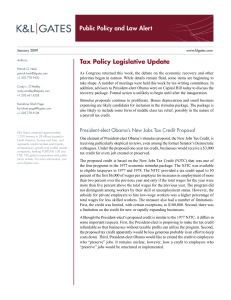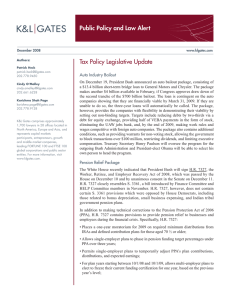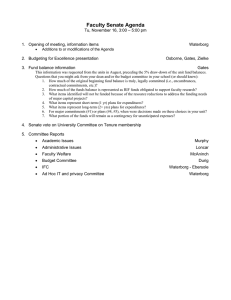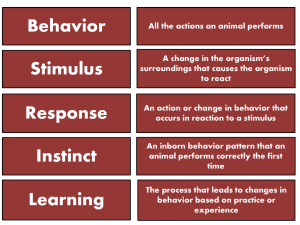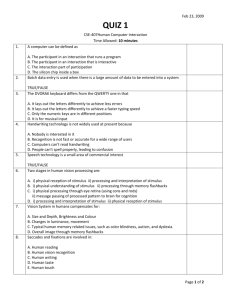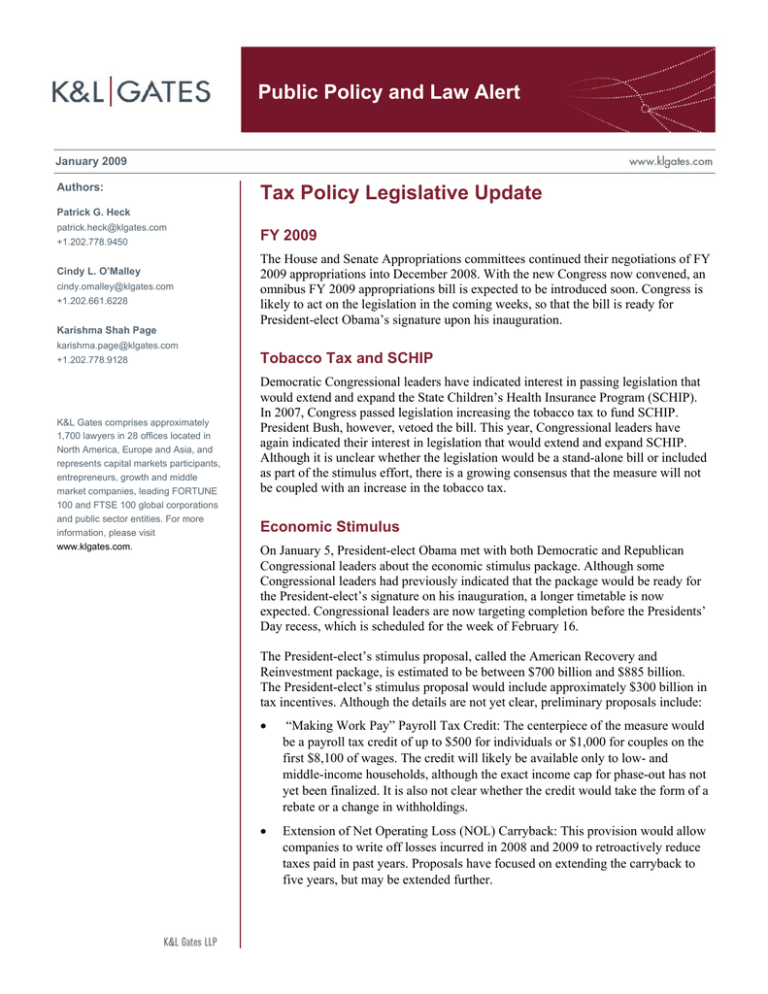
Public Policy and Law Alert
January 2009
Authors:
Tax Policy Legislative Update
Patrick G. Heck
patrick.heck@klgates.com
+1.202.778.9450
Cindy L. O’Malley
cindy.omalley@klgates.com
+1.202.661.6228
Karishma Shah Page
FY 2009
The House and Senate Appropriations committees continued their negotiations of FY
2009 appropriations into December 2008. With the new Congress now convened, an
omnibus FY 2009 appropriations bill is expected to be introduced soon. Congress is
likely to act on the legislation in the coming weeks, so that the bill is ready for
President-elect Obama’s signature upon his inauguration.
karishma.page@klgates.com
+1.202.778.9128
K&L Gates comprises approximately
1,700 lawyers in 28 offices located in
North America, Europe and Asia, and
represents capital markets participants,
entrepreneurs, growth and middle
market companies, leading FORTUNE
100 and FTSE 100 global corporations
and public sector entities. For more
information, please visit
www.klgates.com.
Tobacco Tax and SCHIP
Democratic Congressional leaders have indicated interest in passing legislation that
would extend and expand the State Children’s Health Insurance Program (SCHIP).
In 2007, Congress passed legislation increasing the tobacco tax to fund SCHIP.
President Bush, however, vetoed the bill. This year, Congressional leaders have
again indicated their interest in legislation that would extend and expand SCHIP.
Although it is unclear whether the legislation would be a stand-alone bill or included
as part of the stimulus effort, there is a growing consensus that the measure will not
be coupled with an increase in the tobacco tax.
Economic Stimulus
On January 5, President-elect Obama met with both Democratic and Republican
Congressional leaders about the economic stimulus package. Although some
Congressional leaders had previously indicated that the package would be ready for
the President-elect’s signature on his inauguration, a longer timetable is now
expected. Congressional leaders are now targeting completion before the Presidents’
Day recess, which is scheduled for the week of February 16.
The President-elect’s stimulus proposal, called the American Recovery and
Reinvestment package, is estimated to be between $700 billion and $885 billion.
The President-elect’s stimulus proposal would include approximately $300 billion in
tax incentives. Although the details are not yet clear, preliminary proposals include:
•
“Making Work Pay” Payroll Tax Credit: The centerpiece of the measure would
be a payroll tax credit of up to $500 for individuals or $1,000 for couples on the
first $8,100 of wages. The credit will likely be available only to low- and
middle-income households, although the exact income cap for phase-out has not
yet been finalized. It is also not clear whether the credit would take the form of a
rebate or a change in withholdings.
•
Extension of Net Operating Loss (NOL) Carryback: This provision would allow
companies to write off losses incurred in 2008 and 2009 to retroactively reduce
taxes paid in past years. Proposals have focused on extending the carryback to
five years, but may be extended further.
Public Policy and Law Alert
•
Extension of Bonus Depreciation: The proposal
would extend bonus depreciation measures,
which allow companies to immediately write off
half of the cost of new capital expenditures.
•
Extension of Increased Small Business
Expensing Limits: In the 2008 stimulus bill, the
2008 small business expensing limit was
doubled from $125,000 to $250,000. The
proposed provision would extend the increased
small business expensing limit of $250,000.
•
Tax Credit for Hiring New or Retaining
Employees: Another element of the proposal
includes a one-year tax credit for businesses that
hire new employees or retain current employees.
Under the proposal, businesses would receive a
$3,000 tax credit for every job created or
preserved. It is not clear how such a provision
would be structured and implemented.
Numerous other measures have been suggested.
Proposals related to renewable energy tax incentives
have focused on making existing measures more
usable rather than extending or developing new
policies. Possible incentives include refundability,
tradeability, and carrybacks similar to NOL
carrybacks. Senate Finance Committee Ranking
Member Chuck Grassley (R-IA) has suggested that
the stimulus include a $75 billion measure to prevent
the alternative minimum tax from applying to
additional taxpayers. The treatment of tax extenders
in the stimulus bill also remains unclear. It is not
anticipated that the stimulus will include any
revenue offsets.
Republican support for the stimulus package is
unclear. Although the inclusion of tax relief in the
President-elect’s proposal garnered some favorable
reviews among Republicans, some members remain
concerned about the inclusion of spending measures
in the stimulus package. Senate Minority Leader
Mitch McConnell (R-KY) indicated that he prefers
loans to states, rather than direct grants, for
spending measures. House Minority Leader John
Boehner (R-OH) noted skepticism to a proposed
stimulus measure that would create 600,000 new
government jobs. Staff have suggested that
Republican support for the stimulus bill may be
determined, in part, by the final cost and the
inclusion of Republican priorities in the package.
The House Democratic Steering and Policy
Committee will be holding a hearing on the
stimulus on January 7 for Democratic members
only. The details of the stimulus package will be
negotiated over the next week by Democratic,
House Ways and Means Committee, and Senate
Finance Committee leadership, in conjunction with
the incoming Administration. Details of the measure
will be released soon after. Senate staff members
have suggested that the Senate Finance Committee
may schedule a mark-up as early as next week.
Although Senate Congressional leaders have
indicated a preference for committee consideration
through regular order, staff have suggested that the
package may not be voted on by House committees.
It should be noted that Senate committees have not
yet reorganized. With the absences of former
Senators Gordon Smith (R-OR) and John Sununu
(R-NH), the Senate Finance Committee is currently
comprised of eleven Democrats and eight
Republicans.
K&L Gates comprises multiple affiliated partnerships: a limited liability partnership with the full name K&L Gates LLP qualified in Delaware and
maintaining offices throughout the U.S., in Berlin, in Beijing (K&L Gates LLP Beijing Representative Office), and in Shanghai (K&L Gates LLP
Shanghai Representative Office); a limited liability partnership (also named K&L Gates LLP) incorporated in England and maintaining our London
and Paris offices; a Taiwan general partnership (K&L Gates) which practices from our Taipei office; and a Hong Kong general partnership (K&L
Gates, Solicitors) which practices from our Hong Kong office. K&L Gates maintains appropriate registrations in the jurisdictions in which its offices
are located. A list of the partners in each entity is available for inspection at any K&L Gates office.
This publication is for informational purposes and does not contain or convey legal advice. The information herein should not be used or relied upon
in regard to any particular facts or circumstances without first consulting a lawyer.
©2009 K&L Gates LLP. All Rights Reserved.
January 2009
2

